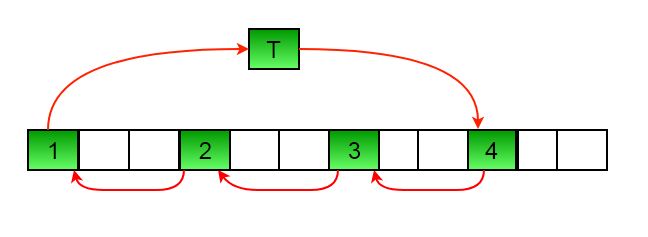Escribe una función rotar(ar[], d, n) que gire arr[] de tamaño n por d elementos.

La rotación de la array anterior por 2 hará que la array

MÉTODO 1 (usando array temporal)
Input arr[] = [1, 2, 3, 4, 5, 6, 7], d = 2, n =7 1) Store the first d elements in a temp array temp[] = [1, 2] 2) Shift rest of the arr[] arr[] = [3, 4, 5, 6, 7, 6, 7] 3) Store back the d elements arr[] = [3, 4, 5, 6, 7, 1, 2]
Complejidad temporal : O(n)
Espacio auxiliar : O(d)
MÉTODO 2 (Rotar uno por uno)
leftRotate(arr[], d, n)
start
For i = 0 to i < d
Left rotate all elements of arr[] by one
end
Para rotar por uno, almacene arr[0] en una variable temporal temp, mueva arr[1] a arr[0], arr[2] a arr[1] …y finalmente temp a arr[n-1]
Tomemos el mismo ejemplo arr[] = [1, 2, 3, 4, 5, 6, 7], d = 2
Rotar arr[] por uno 2 veces
Obtenemos [2, 3, 4, 5, 6, 7, 1 ] después de la primera rotación y [ 3, 4, 5, 6, 7, 1, 2] después de la segunda rotación.
A continuación se muestra la implementación del enfoque anterior:
C#
// C# program for array rotation
using System;
class GFG {
/* Function to left rotate arr[]
of size n by d*/
static void leftRotate(int[] arr, int d,
int n)
{
for (int i = 0; i < d; i++)
leftRotatebyOne(arr, n);
}
static void leftRotatebyOne(int[] arr, int n)
{
int i, temp = arr[0];
for (i = 0; i < n - 1; i++)
arr[i] = arr[i + 1];
arr[n-1] = temp;
}
/* utility function to print an array */
static void printArray(int[] arr, int size)
{
for (int i = 0; i < size; i++)
Console.Write(arr[i] + " ");
}
// Driver code
public static void Main()
{
int[] arr = { 1, 2, 3, 4, 5, 6, 7 };
leftRotate(arr, 2, 7);
printArray(arr, 7);
}
}
// This code is contributed by Sam007
Producción :
3 4 5 6 7 1 2
Complejidad del tiempo: O(n * d)
Espacio auxiliar: O(1)
MÉTODO 3 (Un algoritmo de malabarismo)
Esta es una extensión del método 2. En lugar de mover uno por uno, divida la array en diferentes conjuntos
donde el número de conjuntos sea igual a GCD de n y d y mover los elementos dentro de los conjuntos.
Si GCD es 1 como es para la array de ejemplo anterior (n = 7 y d = 2), entonces los elementos se moverán dentro de un solo conjunto, simplemente comenzamos con temp = arr[0] y seguimos moviendo arr[I+d] para llegar [I] y finalmente almacenar la temperatura en el lugar correcto.
Aquí hay un ejemplo para n = 12 y d = 3. GCD es 3 y
Let arr[] be {1, 2, 3, 4, 5, 6, 7, 8, 9, 10, 11, 12}
a) Elements are first moved in first set – (See below
diagram for this movement)

arr[] after this step --> {4 2 3 7 5 6 10 8 9 1 11 12}
b) Then in second set.
arr[] after this step --> {4 5 3 7 8 6 10 11 9 1 2 12}
c) Finally in third set.
arr[] after this step --> {4 5 6 7 8 9 10 11 12 1 2 3}
A continuación se muestra la implementación del enfoque anterior:
C#
// C# program for array rotation
using System;
class GFG {
/* Function to left rotate arr[]
of size n by d*/
static void leftRotate(int[] arr, int d,
int n)
{
int i, j, k, temp;
/* To handle if d >= n */
d = d % n;
int g_c_d = gcd(d, n);
for (i = 0; i < g_c_d; i++) {
/* move i-th values of blocks */
temp = arr[i];
j = i;
while (true) {
k = j + d;
if (k >= n)
k = k - n;
if (k == i)
break;
arr[j] = arr[k];
j = k;
}
arr[j] = temp;
}
}
/*UTILITY FUNCTIONS*/
/* Function to print an array */
static void printArray(int[] arr, int size)
{
for (int i = 0; i < size; i++)
Console.Write(arr[i] + " ");
}
/* Function to get gcd of a and b*/
static int gcd(int a, int b)
{
if (b == 0)
return a;
else
return gcd(b, a % b);
}
// Driver code
public static void Main()
{
int[] arr = { 1, 2, 3, 4, 5, 6, 7 };
leftRotate(arr, 2, 7);
printArray(arr, 7);
}
}
// This code is contributed by Sam007
Producción :
3 4 5 6 7 1 2
Complejidad temporal : O(n)
Espacio auxiliar : O(1)
Consulte las siguientes publicaciones para conocer otros métodos de rotación de arrays:
Algoritmo de intercambio de bloques para rotación de arrays
Algoritmo de inversión para rotación de arrays
Escriba comentarios si encuentra algún error en los programas/algoritmos anteriores.
¡ Consulte el artículo completo sobre el programa para la rotación de arrays para obtener más detalles!
Publicación traducida automáticamente
Artículo escrito por GeeksforGeeks-1 y traducido por Barcelona Geeks. The original can be accessed here. Licence: CCBY-SA